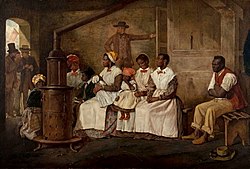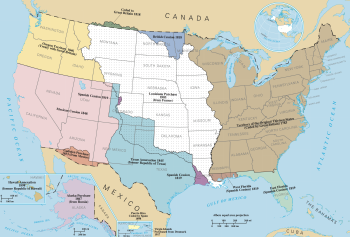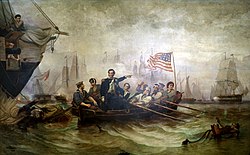Increasing demand for slave labor[edit]
During the first two decades after the Revolutionary War, there were dramatic changes in the status of slavery among the states and an increase in the number of freed blacks. Inspired by revolutionary ideals of the equality of men and influenced by their lesser economic reliance on slavery, northern states abolished slavery.
States of the Upper South made manumission easier, resulting in an increase in the proportion of free blacks in the Upper South (as a percentage of the total non-white population) from less than one percent in 1792 to more than 10 percent by 1810. By that date, a total of 13.5 percent of all blacks in the United States were free.[55] After that date, with the demand for slaves on the rise because of the Deep South's expanding cotton cultivation, the number of manumissions declined sharply; and an internal U.S. slave trade became an important source of wealth for many planters and traders.
In 1807, Congress severed the US's involvement with the Atlantic slave trade.[56]
Louisiana and republicanism under Jefferson[edit]
Jefferson's major achievement as president was the Louisiana Purchase in 1803, which provided U.S. settlers with vast potential for expansion west of the Mississippi River.[57]
Jefferson, a scientist himself, supported expeditions to explore and map the new domain, most notably the Lewis and Clark Expedition.[58] Jefferson believed deeply in republicanism and argued it should be based on the independent yeoman farmer and planter; he distrusted cities, factories and banks. He also distrusted the federal government and judges, and tried to weaken the judiciary. However he met his match in John Marshall, a Federalist from Virginia. Although the Constitution specified a Supreme Court, its functions were vague until Marshall, the Chief Justice (1801–35), defined them, especially the power to overturn acts of Congress or states that violated the Constitution, first enunciated in 1803 in Marbury v. Madison.[59]
War of 1812[edit]
Thomas Jefferson defeated Adams for the presidency in the 1800 election. Americans were increasingly angry at the British violation of American ships' neutral rights to hurt France, the impressment (seizure) of 10,000 American sailors needed by the Royal Navy to fight Napoleon, and British support for hostile Indians attacking American settlers in the Midwest with the goal of creating a pro-British Indian barrier state to block American expansion westward. They may also have desired to annex all or part of British North America, although this is still heavily debated.[60][61][62][63][64] Despite strong opposition from the Northeast, especially from Federalists who did not want to disrupt trade with Britain, Congress declared war on June 18, 1812.[65]
The war was frustrating for both sides. Both sides tried to invade the other and were repulsed. The American high command remained incompetent until the last year. The American militia proved ineffective because the soldiers were reluctant to leave home and efforts to invade Canada repeatedly failed. The British blockade ruined American commerce, bankrupted the Treasury, and further angered New Englanders, who smuggled supplies to Britain. The Americans under General William Henry Harrison finally gained naval control of Lake Erie and defeated the Indians under Tecumseh in Canada,[67] while Andrew Jackson ended the Indian threat in the Southeast. The Indian threat to expansion into the Midwest was permanently ended. The British invaded and occupied much of Maine.
The British raided and burned Washington, but were repelled at Baltimore in 1814 – where the "Star Spangled Banner" was written to celebrate the American success. In upstate New York a major British invasion of New York State was turned back at the Battle of Plattsburgh. Finally in early 1815 Andrew Jackson decisively defeated a major British invasion at the Battle of New Orleans, making him the most famous war hero.[68]
With Napoleon (apparently) gone, the causes of the war had evaporated and both sides agreed to a peace that left the prewar boundaries intact. Americans claimed victory on February 18, 1815 as news came almost simultaneously of Jackson's victory of New Orleans and the peace treaty that left the prewar boundaries in place. Americans swelled with pride at success in the "second war of independence"; the naysayers of the antiwar Federalist Party were put to shame and the party never recovered. Britain never achieved the war goal of granting the Indians a barrier state to block further American settlement and this allowed settlers to pour into the Midwest without fear of a major threat.[68] The War of 1812 also destroyed America's negative perception of a standing army, which was proved useful in many areas against the British as opposed to ill-equipped and poorly-trained militias in the early months of the war, and War Department officials instead decided to place regular troops as the nation's main defense.[69]
Second Great Awakening[edit]
The Second Great Awakening was a Protestant revival movement that affected the entire nation during the early 19th century and led to rapid church growth. The movement began around 1790, gained momentum by 1800, and, after 1820 membership rose rapidly among Baptist and Methodist congregations, whose preachers led the movement. It was past its peak by the 1840s.[70]
It enrolled millions of new members in existing evangelical denominations and led to the formation of new denominations. Many converts believed that the Awakening heralded a new millennial age. The Second Great Awakening stimulated the establishment of many reform movements – including abolitionism and temperance designed to remove the evils of society before the anticipated Second Coming of Jesus Christ.[71]
Era of Good Feelings[edit]
As strong opponents of the war, the Federalists held the Hartford Convention in 1814 that hinted at disunion. National euphoria after the victory at New Orleans ruined the prestige of the Federalists and they no longer played a significant role as a political party.[72] President Madison and most Republicans realized they were foolish to let the Bank of the United States close down, for its absence greatly hindered the financing of the war. So, with the assistance of foreign bankers, they chartered the Second Bank of the United States in 1816.[73][74]
The Republicans also imposed tariffs designed to protect the infant industries that had been created when Britain was blockading the U.S. With the collapse of the Federalists as a party, the adoption of many Federalist principles by the Republicans, and the systematic policy of President James Monroe in his two terms (1817–25) to downplay partisanship, the nation entered an Era of Good Feelings, with far less partisanship than before (or after), and closed out the First Party System.[73][74]
The Monroe Doctrine, expressed in 1823, proclaimed the United States' opinion that European powers should no longer colonize or interfere in the Americas. This was a defining moment in the foreign policy of the United States. The Monroe Doctrine was adopted in response to American and British fears over Russian and French expansion into the Western Hemisphere.[75]
In 1832, President Andrew Jackson, 7th President of the United States, ran for a second term under the slogan "Jackson and no bank" and did not renew the charter of the Second Bank of the United States of America, ending the Bank in 1836.[76] Jackson was convinced that central banking was used by the elite to take advantage of the average American, and instead implemented state banks, popularly known as "pet banks







No comments:
Post a Comment